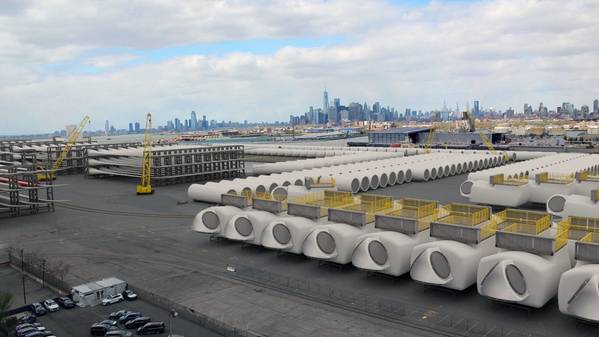
The storied South Brooklyn Marine Terminal (SBMT) complex in Brooklyn, N.Y. will be transformed into a major regional hub for offshore wind under a new agreement signed Thursday.
Energy companies Equinor and bp said they reached a deal with terminal operator Sustainable South Brooklyn Marine Terminal (SSBMT) and New York City Economic Development Corporation (NYCEDC) to transform the terminal into an offshore wind port for staging and assembling offshore wind technology components for the Empire Wind and Beacon Wind projects and for the growing U.S. offshore industry on the East Coast.
Siri Espedal Kindem, President of Equinor Wind U.S., said, “With the support of NYCEDC, SSBMT and our partners in the community, Equinor and bp are ready and eager to invest in the revitalization of SBMT, an historic port that will soon become a major part of New York’s energy future. New York has shown unflagging determination to become a focal point of the region’s offshore wind industry, and this agreement offers tangible evidence that this vision is quickly coming to life.”
Equinor and bp will create an operations and maintenance (O&M) hub and staging area at SBMT, with a total investment of $200-250 million in infrastructure upgrades, while also pursuing the development of SBMT as a low-emissions facility.
At approximately 73.1 acres, SBMT will be one of the largest dedicated offshore wind port facilities in the United States. It is the only industrial waterfront site in the New York City area with the capacity to accommodate wind turbine generator staging and assembly activities at the scale required by component manufacturers.
Equinor and bp’s activities at SBMT are anticipated to support over one thousand jobs annually in the region.
“This agreement builds on the City’s $57 million commitment to reactivate SBMT as a key manufacturing and operations base and will help make New York a leader in climate resiliency as well as air quality through clean energy investments,” said NYCEDC Chief Strategy Officer and Executive Vice President Lindsay Greene. “Working together with our partners at Equinor, bp, and SSBMT, we are also advancing economic recovery and increasing diversity in waterfront construction, by helping local minority- and women-owned business enterprises benefit from the growing offshore wind industry and take advantage of the green jobs of the future.”
Felipe Arbelaez, bp’s senior vice president for zero carbon energy, said, “Today marks the first of many positive ripple effects from this project – and we want them to reverberate far and wide. As we reinvent energy, we also want to help reinvent the communities that help deliver it by investing in the skills and capabilities needed. By creating this regional hub we are able to do just that and it brings us all one step closer to delivering this incredible offshore wind development.”
Equinor recently announced the opening of the New York offshore wind project office, adjacent to SBMT in Industry City, to serve as the hub for Equinor and bp’s regional offshore wind activities. The office will also be home to an offshore wind learning center that will provide New Yorkers an opportunity to learn about this growing new industry.




